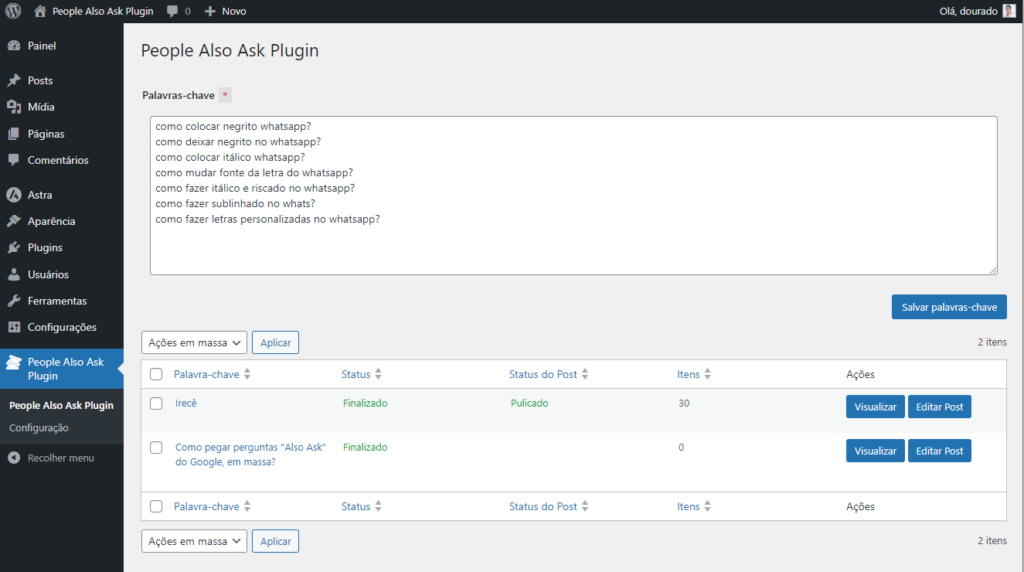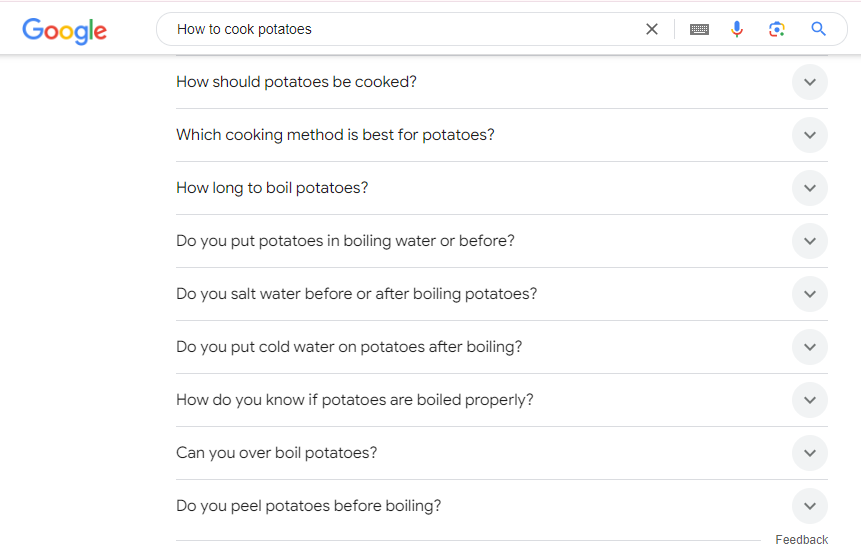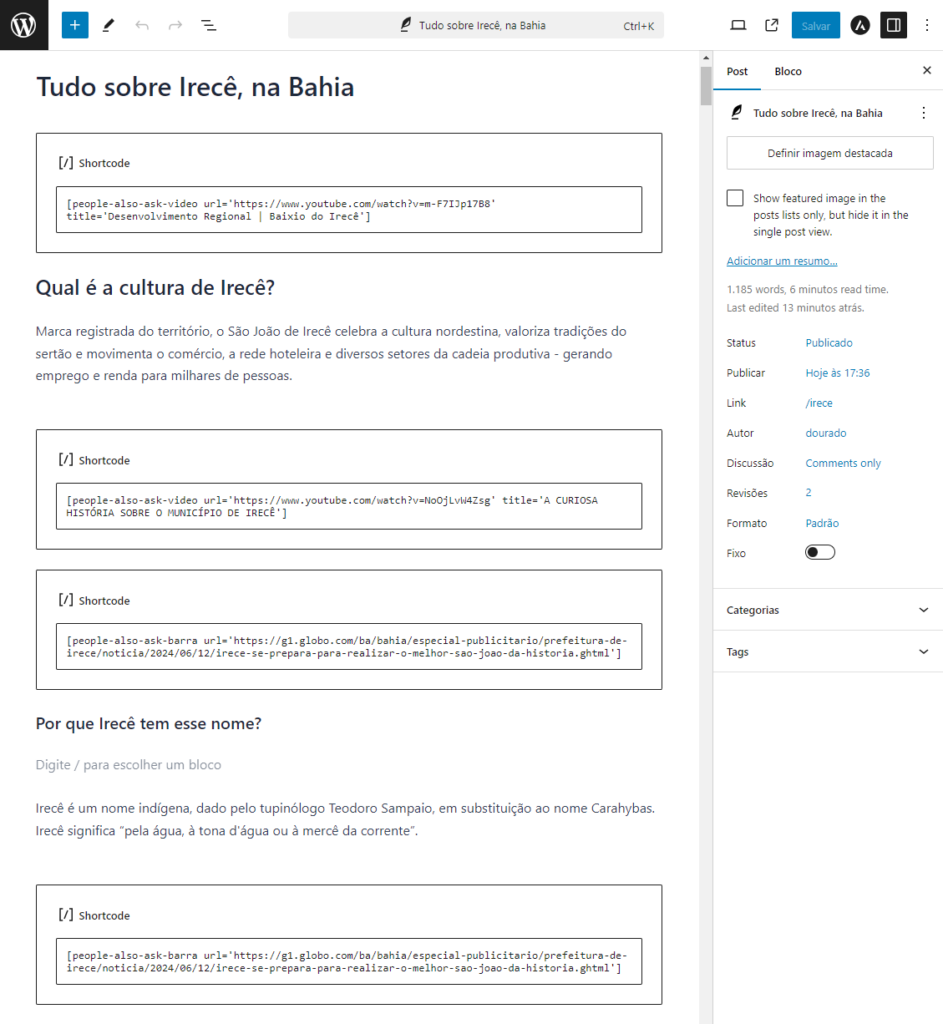WordPress plugin for mass content generation based on “People Also Ask” questions from Google’s SERP
Are you looking for a quick way to create mass content automatically for your blog with just a few clicks?
Introducing the People Also Ask Plugin, the ideal solution to boost your SEO strategy!
Here’s how the plugin works:
Video 1: Tool Operation
Video 2: Generating bulk content based on Google SERP “Also Ask” questions
1) Provide a List of Keywords
Enter a list of keywords to create your articles!
If you provide 50 keywords, 50 articles will be created.

2) Mass Scraper for Google’s “People Also Ask” Questions
The plugin scrapes Google’s search results pages (SERP) and collects the most frequently asked questions in the “People Also Ask” section related to a specific topic.
It will perform this task multiple times across various search levels, thereby generating long and rich articles.

3) Automatic Creation of WordPress Posts Based on People Also Ask Questions
After scraping the questions, the plugin will group the questions and answers on the topic and automatically create a post on your WordPress site. It will draft the article with the correct semantics, including H2 and H3 headings.
Your articles will provide relevant answers and increase the visibility of your content in searches!

You can check out some examples of content generated with the Plugin at this link:
https://peoplealsoaskplugin.com/category/article-examples/
How do I acquire the plugin?
Download Demo Version: link
Buy license: link
If you need help, contact us via email: caique@peoplealsoaskplugin.com
What are you waiting for?
Provide immediate answers to people’s frequently asked questions!
Attract more traffic and increase your chances of appearing in the Top 0 and the first positions on Google.
Don’t miss the opportunity to turn your website into a powerful source of visits. Install the People Also Ask Plugin today and reach a new level!
Available languages:
- Afrikaans (af)
- Akan (ak)
- Albanian (sq)
- Amharic (am)
- Arabic (ar)
- Armenian (hy)
- Azeri (az)
- Balinese (ban)
- Basque (eu)
- Belarusian (be)
- Bengali (bn)
- Bosnian (bs)
- Bulgarian (bg)
- Burmese (my)
- Catalan (ca)
- Cebuano (ceb)
- Chichewa (ny)
- Chinese (Simplified) (zh-CN)
- Chinese (Traditional) (zh-TW)
- Croatian (hr)
- Czech (cs)
- Danish (da)
- Dutch (nl)
- English (en)
- Espanol (Latinoamerica) (es-419)
- Estonian (et)
- Ewe (ee)
- Faroese (fo)
- Farsi (fa)
- Filipino (fil)
- Finnish (fi)
- French (fr)
- Frisian (fy)
- Ga (gaa)
- Galician (gl)
- Ganda (lg)
- Georgian (ka)
- German (de)
- Greek (el)
- Gujarati (gu)
- Haitian (ht)
- Hausa (ha)
- Hebrew (he)
- Hebrew (old) (iw)
- Hindi (hi)
- Hungarian (hu)
- Icelandic (is)
- IciBemba (bem)
- Igbo (ig)
- Indonesian (id)
- Irish (ga)
- Italian (it)
- Japanese (ja)
- Kannada (kn)
- Kazakh (kk)
- Khmer (km)
- Kinyarwanda (rw)
- Kirundi (rn)
- Kongo (kg)
- Korean (ko)
- Kreol morisien (mfe)
- Kreol Seselwa (crs)
- Krio (kri)
- Kurdish (ckb)
- Kyrgyz (ky)
- Lao (lo)
- Latvian (lv)
- Lingala (ln)
- Lithuanian (lt)
- Luo (ach)
- Macedonian (mk)
- Malagasy (mg)
- Malay (ms)
- Malayam (ml)
- Maltese (mt)
- Maori (mi)
- Marathi (mr)
- Mongolian (mn)
- Montenegro (sr-ME)
- Nepali (ne)
- Northern Sotho (nso)
- Norwegian (no)
- Nyankole (nyn)
- Oromo (om)
- Pashto (ps)
- Pidgin (pcm)
- Polish (pl)
- Portuguese (pt)
- Portuguese (Brazil) (pt-BR)
- Portuguese (Portugal) (pt-PT)
- Punjabi (pa)
- Quechua (qu)
- Romanian (ro)
- Romansh (rm)
- Russian (ru)
- Serbian (sr)
- Serbian (Latin) (sr-Latn)
- Sesotho (st)
- Shona (sn)
- Silozi (loz)
- Sindhi (sd)
- Sinhalese (si)
- Slovak (sk)
- Slovenian (sl)
- Somali (so)
- Spanish (es)
- Swahili (sw)
- Swedish (sv)
- Tajik (tg)
- Tamil (ta)
- Telugu (te)
- Thai (th)
- Tigrinya (ti)
- Tonga (Tonga Islands) (to)
- Tshiluba (lua)
- Tswana (tn)
- Tumbuka (tum)
- Turkish (tr)
- Turkmen (tk)
- Ukrainian (uk)
- Urdu (ur)
- Uzbek (uz)
- Vietnamese (vi)
- Wolof (wo)
- Xhosa (xh)
- Yoruba (yo)
- Zulu (zu)
